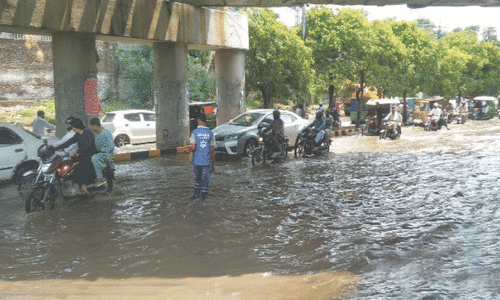When we look at the images of relentless monsoon fury, we see among other things dead bodies, battered families, destroyed houses, inundated croplands, and washed away crops and dead animals in the water.
What touches us most is the spectacle of the families that have vulnerable children and women without shelter having nowhere to go. What it evokes in us is pain, compassion and empathy, even pity. Consequently we feel compelled to do something that would alleviate their sufferings. The first response is driven by what may be called species instinct; how to save our species from death or extinction. Such an impulse or instinctive drive we share with all other living creatures. In the absence of such a thing no species can ensure its survival.
German poet Brecht expresses it in a poetic way: “When a child is about to be run down by a car one pulls it on the pavement/Not the kindly man does that, to whom they put up monuments/Anyone pulls the child away from the car.”
Likewise we want to pull the people away from the piles of rubble they have been trapped in. But how to do it? What comes immediately to mind is what is needed for physical survival; food, water, bedding, tents and medicines. Rescue operations are on. Rehabilitation phase is still not in sight as the floodwater hasn’t fully receded yet. All the concerned government and non-government organisations seem to have geared up. They are scrambling to collect what is obviously needed by the flood victims. Focus is on the provision of goods and services which is of course what the marooned people cry for at the moment. But such is the scale of calamity that even dedicated men and women engaged in humanitarian endeavour know that even their best efforts can’t enable them to be equal to the task.
Sadly what worries one at the moment is that there seems to be no clarity on the priorities. Short-term measures are fine but long-term ones are a must if we want to see our people having semblance of normal life after the traumatic experience of Biblical proportions. In order to set priorities right one needs to have a holistic picture of the disastrous situation.
In simple words fact must be taken into account of what the affected people have been deprived of. In the countryside their houses have been destroyed, crops have been washed away and gushing floodwater has killed their livestock. All these things have been the mainstay of their economic and social existence. A destroyed house means no shelter and a working person without shelter would be at the mercy of nature and severely handicapped in his/her activities. The worst hit would be children and women who help in raising crops and rearing and looking after livestock. A shelterless farmer means among other things a lowered of level of productivity.
Farmers, the bulk of workers in our agrarian economy, are always cash strapped. They are forced to rely on loans as they have to buy seeds, pesticides, sprays on deferred payment. Deferred payment means either selling one’s crop cheaply to the lenders or paying interest which can be exorbitant. How they are going to pay their debts and eke out a living with their crops washed away and livestock gone? Livestock in the countryside is a valuable and yet affordable source of nutrition that keeps the family physically sustainable. Besides, selling of extra milk of buffalos and cows provides the peasant household with a bit of cash for day today needs. What it all boils down to is money; people need cash to rebuild their lives and they will do it bit by bit as they are hard-working lot. They are used to earn their living hard way as they are not given to comforts like our urban folks. Secondly, they are the least demanding. They can live with bare minimum provided they are provided with bare minimum in a situation where they are left with nothing. They are, to borrow a military phrase, battle-hardened. They can live without bottled water and soft bedding. They have high level of immunity because of the tough life they lead. They can sleep at night without mosquito nets and desert coolers. But surely they can’t live without roof over their heads, buffalo/cow and fields. In other words what they desperately need is cash, hard cash as they need it to build a modest house, buy a milch animal and get seeds and other inputs for the next crop.
Similarly the people affected in towns whose houses and small businesses have been eliminated cannot put their life back on track without cash. It’s not that they don’t need anything else. They do but without cash at the initial stage of rehabilitation even most enterprising among them would find it extremely difficult if not impossible to pick pieces and make a fresh start. There is a real fear of their being stuck in the jaws of loan sharks which will further debilitate our weak economy reeling from a crushing loss in agriculture sector. But unfortunately there is a serious problem; our people, international donors and aid agencies find no transparent mechanism of cash collection and distribution in place. The past corrupt practices of concerned government departments and some NGOs have made the entire process suspect.
Corruption and favouritism have created a huge trust deficit. What is immediately needed is a serious effort to establish an effective cash collection and distribution mechanism that is not only transparent but also looks so to the extent that it could be trusted with donors’ money. Remember if our farmers are allowed to go under the rest of the country shall starve on the surface. “After us the deluge” if we fail to act. And it would be more devastating for our future. — soofi01@hotmail.com
Published in Dawn, September 5th, 2022












































Dear visitor, the comments section is undergoing an overhaul and will return soon.